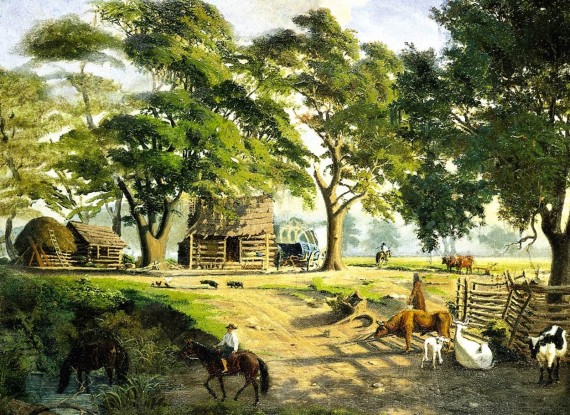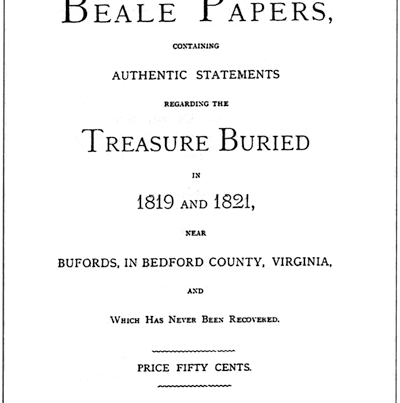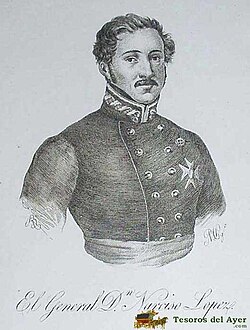
The advent of my coming and going to another world was not through a portal handcrafted from a felled silver-barked tree of old, but the factory-made casket of my Father. My people bury in several places–my Father, a stone’s throw from Sarah Cannon, right down the street from where Tate was roused to write his Ode. He died at 61 without even a warning shot in September 2018.
The death of my Father did not push me to question my faith, but I had questions. My first question: Why don’t I know anything about my ancestors? Seeking answers led me to the world of Genealogy. New to me but many passports bare its stamp. I’ll have a few stories from my travels later.
I also found a world whose portal is below that “Old Surveyors’ Line” filled with learned men and storytellers—stocked with thousands of volumes on community, tradition, identity, deracinated culture, localism, family ties, having “a sense of place,” kith, kin, and reminding us to remember. Their heavy-handed words hit me like a right hand from Mike McCoole. I was whooped good but turns out it was for my own good. With fresh faithful wounds of my Southern friends, I had to come to grips that my hold on what matters was weaker than Rose’s on Jack. I couldn’t let what binds me to family and Southern tradition go the way of the Titanic.
At first, it was a struggle to locate my experience of family and tradition in my reading. Eventually, I found the water absorbed by my roots were the backwoods mountain springs that flow through copper condensation coil and not those of the Tidewater Tuckahoe.
Dr. Clyde Wilson wrote M.E. Bradford believed “the South would survive if its city dwellers remembered the old home place and the extended family where their roots were—if they kept their pietas toward the universe.” Like an Uncle Sam poster of a world at war, I felt a clear call to my remembering duty and enlist for the duration of the war as a Southern Lifeguard. Faulkner coronated his aunt as “The keeper of the family story.” Here are a sampling of stories from attempts to honor my duty to remember and honor my Ancestors.
My Dad loved his family. I have fond memories of family gatherings (many of cigarette smoke and plenty of dancing) with relatives I couldn’t name (do a quick search for: cousin calculator chart). I never met my Dad’s Father. He died the same day I was born. Marlboro Reds got’em. He was 54 years old. My maternal Grandparents have lived in the same house in Hendersonville, TN, my whole life. I never heard my Father speak of his Grandparents; my Mom’s Parents don’t know much regarding their Grandparents. I had so many questions and needed to know.
My maternal Grandparents live 30 miles up the road, and I visit often. Recently I recorded conversations with them about their lives and now possess priceless audio of my Grandma reminiscing about playing on her people’s farm as a young girl in Trafford, Alabama. My Grandpa telling about run-ins with the law, frequenting Grundy County honky-tonk joints, drinking bootleg whiskey and how homemade wine will get you so drunk sick you’ll try to bargain with the Lord. He spoke of Pearl Dishroon, his “momma’s momma, made some big ‘ol biscuits, yeah … they made them big ‘ol biscuits back in them days.”
Piecing everything together can be difficult, several times I felt like a mix between Carrie Mathison off her meds and John Nash from “A Beautiful Mind.” I mean, when almost every male in one line is named Moses John Shrum or John Moses Shrum, my appreciation for Bourbon is strengthened.
An Alabama State Archives librarian helped me solve one head-scratcher. Why does Theodore B. Steely, my 2nd Great-Granduncle’s tombstone read, “A BRAVE SPIRIT LIES BURIED HERE WHO DIED A GLORIOUS DEATH IN HIS COUNTRY’S CAUSE.”, that he died in 1863, yet he shows up in the 1870 Census? There’s a couple of lines that seem to hold on to some ancient oath and unlikely to crack if waterboarded, what they call a “brickwall” in the genealogy world. One of my kin was indicted by the feds, something about coal mines and union dues, but I can’t track down his branch one bit. (FYI, you have 4,096 10th Great-Grandparents).
I’m not big on Facebook, but I created a Steely Family group recently to connect with family. Without this group, I’d have never heard my Kin used to own the land where Barbara Mandrell built her Fontanel Mansion, and their house turned into the gift shop. My Great-Grandma’s Father killed a man, and she hid her Father in a cave nearby bringing him food and sundries to help him survive. No one knows what became of him. My Great-Grandfather, James William Steely, born in Flomaton, Alabama, moved to Lebanon, Tennessee between 1910-1913. His brother was an actual hobo. Rode the trains to different hobo camps across the nation. Occasionally, some Family went with him; they would jump off the train as it crossed a bridge into the river below. One of our relatives, a sheriff of the town close by, would pluck them from the river. Pure gold!
Through my research, I’ve discovered many Confederate Ancestors, like my 3rd Great-Grandfather S.J. Gamble, Private in the 3rd Regiment Alabama Infantry. Enlisted 1862/09/25, Clark County, Alabama. Records show him absent without leave since the Battle of Gettysburg, he was a prisoner and died at Fort Donaldson. Union Prisoner of War Records note his capture at Hagerstown, 1863/07/14, forwarded to Point Lookout, Maryland, 1863/09/15, where he died at the Hammond, U.S. Army General Hospital. James Polk Steely, with Georgia’s 17th Infantry, my 1st Cousin 4x Removed, captured at Gettysburg. He’s on the 1850 census selling peanuts at age 6. He returned home to Georgia, married Mary Elizabeth Culpepper on Nov 5, 1868, and moved to Corsicana, Texas. My 3rd Great-Grandfather and his brother fought with the 35th Regiment, Tennessee Infantry (5th Infantry) (1st Mountain Rifle Regiment). When one went home sick and didn’t return, the other “deserted at Tyner’s Station, Aug 17, ‘63. Took with him 1 waist belt & plate, cap pouch & 52 caps = $4.35.”
My family tree is undoubtedly of the Southern variety. Most were farmers. My 3rd Great-Grandfather, James L Steely, Georgia born but lived in Red Level, Alabama, had three brothers, all were Baptist preachers, one sent to Alabama’s Indian Territory as a missionary. In the 1880 Mobile, Alabama Census, you can find my folks in the “Steely’s Store” District. Theodore Abner Steely, my 1st Cousin three times removed, of Sunflower, Alabama, registered for the WWI Draft. His Occupation: “Insane”. In the 1920 Census, he’s listed as an “Inmate” at the Bryce Hospital for the Insane. My Grandpa’s Father, dug coal by day and preached by night, would pull up next to the local jail and preach through loudspeakers on his car.
My folks appear in bygone newspapers, out-of-print books on Coosa County, Alabama and Twiggs County, Georgia. They’re mentioned in old wills, land patents signed by President Zachary Taylor, and church histories. I can find kin born across the Southland, places like Weakley and Davidson County, Tennessee; Catawba and Rowan County, North Carolina; Escambia, Florida; Paintrock, Alabama; Cherokee Nation, Georgia, Maryland, Virginia, South Carolina, and Texas.
Through DNA research I connected with a cousin who is 86 years old and has researched the Steely/Steeley family since 1960. He sent me all his notes. We know our Steely line popped up in North Carolina on the 1790 Census. I have three 5th Great-Grandfathers on one page in the 1790 Census of Cumberland/Sampson County, NC. We’re still trying to connect them to where our DNA points, the borderlands in England, Scotland, and Northern Ireland.
I have found many answers to my first question, but I enlisted for life in this cause. My Ancestors were Southern, most branches established in Colonial days, all before the War. Learning about my family’s history is learning about the South—linking me to what Donald Davidson calls the “folk chain of memory.”
P.S.A: Genealogical research presents excellent opportunities for book buying! When I learned about Confederate Ancestors, I needed books on the War and their regiments. I’ve grabbed books on the history of Baptists in Georgia, Indian Wars, Southern migration routes, British Isles genetics, Celtic history, the peopling of [insert place], and atlases (I love a good map). I also discovered something akin to Southern history publications–Southern Genealogical Societies, state and local. (It’s definitely on-brand that “American Ancestors” is the domain name for the New England Historic Genealogical Society.)
I’m closing in on four years since my Father’s death. I’ve learned much about the family he loved and a smidgen about where they called home. The surface only reveals a few faint scratches. I plan to keep traveling to other worlds. It’s the only way I know how to stay planted in this one. Our Southern Prophets have reminded us to never disconnect the people from the land which recalls the poem “A Land Without Ruins” by Abram Ryan, “Poet-Priest of the South”:
“A land without ruins is a land without memories — a land without memories is a land without history. A land that wears a laurel crown may be fair to see; but twine a few sad cypress leaves around the brow of any land, and be that land barren, beautiless and bleak, it becomes lovely in its consecrated coronet of sorrow, and it wins the sympathy of the heart and of history. Crowns of roses fade — crowns of thorns endure. Calvaries and crucifixions take deepest hold of humanity — the triumphs of might are transient — they pass and are forgotten — the sufferings of right are graven deepest on the chronicle of nations.”
Yes, give me the land where the ruins are spread,
And the living tread light on the hearts of the dead;
Yes, give me a land that is blest by the dust,
And bright with the deeds of the down-trodden just.
Yes, give me the land where the battle’s red blast
Has flashed to the future the fame of the past;
Yes, give me the land that hath legends and lays
That tell of the memories of long vanished days;
Yes, give me a land that hath story and song!
Enshrine the strife of the right with the wrong!
Yes, give me a land with a grave in each spot,
And names in the graves that shall not be forgot;
Yes, give me the land of the wreck and the tomb;
There is grandeur in graves — there is glory in gloom;
For out of the gloom future brightness is born,
As after the night comes the sunrise of morn;
And the graves of the dead with the grass overgrown
May yet form the footstool of liberty’s throne,
And each single wreck in the war-path of might
Shall yet be a rock in the temple of right.






That was fun, reading your story. Kind of makes me jealous (I’m a Californian). And that poem … fantastic!! Really. Thank you.
Thank you, Chase. It was not until I lost my father in 2008 did I even learn of my family’s distant past of poverty during the Depression in Georgia. My father never spoke of his youth before his high school days in Miami. The revelation about my father and his parents birthed both pride and amazement in the years that followed. Then I too dug into my ancestry, determined to unearth more details about my southern roots. My grandfather, Wiley Virgil Brown, Sr. (my father was Junior) was the first of nis family to walk away from scratching a living from the soil in North Georgia. He became a tile layer in Atlanta until the Depression led him to Aiken SC and despair. My grandmother moved in with her sister in Atlanta and my father and his brother went to live on Uncle Carey Ford’s farm in Snellville, GA. In the meantime, my grandfather searched for work. In 1940, my grandfather landed a job as a tile layer in Miami thanks to my grandmother’s brother-in-law and the family reunited in Florida. It is from this point in history my father and grandparents often spoke about, but never the earlier tough years.
Finally, curiosity over how deep my southern roots ran, I dug deeper, I too learned many of my paternal ancestors fought and died in the Civil War, and though most were farmers, at least one, Wiley Waters Webb, Sr., my great-great-grandfather, owned at least fifty slaves in Walton County. He committed suicide in 1865 after losing his lands and three of his sons as a result of the war. The Brown line travels north out of Georgia into the Carolinas and into Virginia with origins in England. Now, for the rest of the story, my father married a Yankee bride who boasted her Irish roots on her mother’s side. I had heard though her father, William King, was born in Harrison, Arkansas but raised in the Bronx. I learned his mother, my great grandmother, Lucinda Brightman King, came from a long line of Brightman’s from Arkansas, Missouri and Kentucky. Except for my Irish blood through my grandmother’s Fogarty line, I am far more southern than I ever suspected. Maybe that’s why I became a southern author and embrace southern tales.
The poem by Abram Ryan spoke volumes, as did your story.
T. M. Brown
Thanks for sharing this, Mike. My dad didn’t like speaking of my mother’s side of the family, as he thought them coarse and vulgar with their thick southern accents and blue collar ethos. Wiley Waters Webb is my 4th great grandfather, so I supposed we’re kin on some level. I’ve started really exploring these deep southern roots the older I get (I’m 54 now). I’ve lived in Georgia most of my life, but really wasn’t exposed much to those traditions due to my father’s disposition. It’s a lot of fun. I was surprised and saddened when I learned about WWW”s fate. Yes, slavery was evil, but this was a horrible, terrible amount of loss he suffered. I can only imagine.
Regards,
Doug Elser
I commend my fellow Tennessean for his essay about “seeking answers in the world of genealogy.” I am awe-struck by the number of Confederate ancestors he has. I have only one I know of for sure. We were not a particularly fertile bunch. But then my grandfather–Pinkney Madison Moore–was an old man when he married my grandmother, who was a young sprig of a thing and his second wife. He came over from Coosa County (AL) and–who knows?–may have known some Steely’s.
In any case, the article is prompting me back into the family history research process once more. It is tedious, sometimes frustrating, but often rewarding beyond the dreams of avarice, as Dr. Johnson or someone said. So much to do, so little time.
I love this poem at the end. Absolutely love it. The story is fun but that poem ….wow.
See, I like it so much, I wrote it twice (not realizing it).